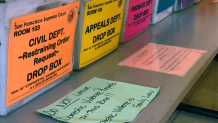Legal documents, which include the names of domestic violence victims and children caught in custody battles, have been left unmonitored in open boxes for weeks inside the lobby of the San Francisco Superior Courthouse, despite state laws that require the court to keep such information private. An NBC Bay Area hidden-camera investigation reveals how documents relating to restraining orders, adoption applications, and custody disputes have been left unsecured, allowing anyone to access them once passing through the security checkpoint at the entrance of the courthouse.
Presumably, somebody could pretty easily dig through the documents and even pull out sensitive materials...and walk out with them.
Jerry Flanagan, litigation director for Consumer Watchdog
“Apparently there's no staff member assigned to watching the table or checking I.D.’s,” said Jerry Flanagan, litigation director for Consumer Watchdog, a non-profit focused on exposing government and corporate injustice. “Presumably, somebody could pretty easily dig through the documents and even pull out sensitive materials...and walk out with them.”

80% of Courtrooms Closed at San Francisco Superior Court
Inside San Francisco Superior Court, normal operations - like much of the country - are no longer in effect. About 80% of the courtrooms there have been closed in light of COVID-19, according the court’s website. In an effort to limit person-to-person contact, people can no longer hand over their documents to a clerk to be filed. Instead, individuals must drop off their paperwork in boxes set up in the lobby, and then return at a later date to pick up their legal paperwork after the court has processed it.
“This is not a problem solely related to the current pandemic,” Flanagan said. “What it's putting on display is a problem with a paper-based legal system that was an issue even prior to the pandemic.”

Only About One Third of California Superior Courts Offer E-Filing
Local
Each of California’s 58 counties has its own Superior Court. Twenty counties offer at least some type of e-filing for court cases, so people can log on to their computers and submit their confidential documents online.
In the Bay Area, e-filing is a work in progress. San Francisco began to move towards electronic filing more than a decade ago but has yet to finish the job.
“Literally in the backyard of Silicon Valley, the San Francisco courts are still on paper filing for some of the most sensitive matters,” said Flanagan.
Advocates Fear Privacy Concerns Will Deter Domestic Violence Victims from Filing Cases
Flanagan pointed out that, aside from a breach of confidentiality, the public exposure to sensitive information might deter people from filing cases. “If they understand their...sensitive family information or spousal abuse will be open to the public, they may not file the dispute at all, and the concern is that there is actually a physical violence possibility,” he said. “And if you don’t file the dispute, then the physical violence possibility could be a reality.”
The initial filings for all cases in San Francisco must be done on paper. Family cases, including domestic violence restraining orders, custody disputes and adoptions, must all be filed in-person with paper documents.
If they understand their...sensitive family information or spousal abuse will be open to the public, they may not file the dispute at all.
Jerry Flanagan, litigation director for Consumer Watchdog
Marin and Solano counties do not offer any e-filing. Neither does Alameda County, which still accepts documents via fax transmission, a held-over technology that reached popularity back in the 1970s.
“I think the barriers to going digital have largely vanished because everyone is just more used to going digital in their personal lives with their personal devices,” said Neeracha Taychakhoonavudh, executive vice president of Industries with Salesforce, which made $17 billion last year helping governments and businesses move their work flows off of paper and into the cloud.
COVID-19 or not, the urgency is very, very present
Neeracha Taychakhoonavudh, executive vice president of Industries with Salesforce, discussing the need for the private and public sectors to embrace the transition into the digital age
“You look at reducing paper, you look at keeping track of statistics and data. It is easier in an electronic world,” said Taychakhoonavudh, acknowledging that computerized filing may also bring privacy concerns. “I think that that is why the public sector is a lot more cautious in terms of moving down this path because they have that responsibility to us as citizens to do that,” she said.
Taychakhoonavudh said many government agencies have already embraced computer filing, and that there are many ways to ensure private data is protected.
San Francisco Superior Court Spokesperson Declined to be Interviewed
A spokesperson for San Francisco Superior Court declined to be interviewed on camera.
“We have reviewed the way the court is processing sensitive documents during the Coronavirus (COVID-19) crisis and have implemented a system so that confidential documents cannot be viewed by the public,” court spokesperson Ken Garcia wrote in a statement.
Despite repeated requests, Garcia would not comment on the specific changes the court implemented or the date on when those changes were made.
The court does not discuss its internal operations.
Ken Garcia, spokesperson for San Francisco Superior Court
“I would reiterate my statement from Friday - confidential documents cannot be viewed by the public. As to your other questions, the court does not discuss its internal operations,” Garcia wrote in an e-mail to the Investigative Unit.
Following that exchange, the Investigative Unit returned to Superior Court to find that the boxes filled with legal documents had been removed. Those hoping to pick up their processed court documents will now have to wait until May 4th before returning to the courthouse, according to a San Francisco Sheriff’s deputy stationed at the security checkpoint at the courthouse entrance.

Court Enacts Changes Following NBC Bay Area Investigation
The boxes of documents, according to the guard, were removed on Monday. It was the prior Friday, three days earlier, when the NBC Bay Area Investigative Unit reached out to the court with questions concerning its process for securing documents.
“I think there are relatively easy fixes,” said Jerry Flanagan, “checking I.D.’s to make sure that folks are picking up the correct documents and also to make sure other folks are not digging through these filing boxes and removing documents that they shouldn't.”

Normal operations are scheduled to resume at San Francisco Superior Court next month, however, that date has been pushed back before in the midst of the current pandemic. It is unclear how much longer people may now have to wait to resolve even the most urgent legal issues.
“The reason that folks are filing these cases during a pandemic is because they're critically important to an immediate matter of personal safety and health,” said Flanagan. “So we need to keep the courts open to address these issues, but that's not an excuse for ignoring personal privacy.”



